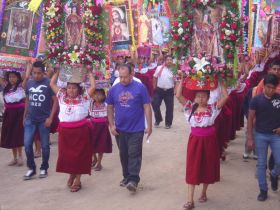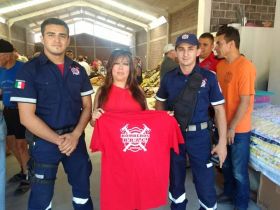What is the culture of Chapala and Ajijic, Mexico?
Santiago Hernandez - Chapala Med
 The culture of Chapala and Ajijic is a mix of Mexican and North American culture. It also varies depending on your social circles. The expats tend to stay with the expats, so when you go to their parties or get-togethers, everything tends to be like they are in the US. I have an expat friend who socializes with a lot of the lawyers here and goes to a lot of their functions, so his experience tends to be quite Mexican, and his Spanish is very good. Socially and culturally, he is very...
The culture of Chapala and Ajijic is a mix of Mexican and North American culture. It also varies depending on your social circles. The expats tend to stay with the expats, so when you go to their parties or get-togethers, everything tends to be like they are in the US. I have an expat friend who socializes with a lot of the lawyers here and goes to a lot of their functions, so his experience tends to be quite Mexican, and his Spanish is very good. Socially and culturally, he is very... The culture of Chapala and Ajijic is a mix of Mexican and North American culture. It also varies depending on your social circles. The expats tend to stay with the expats, so when you go to their parties or get-togethers, everything tends to be like they are in the US. I have an expat friend who socializes with a lot of the lawyers here and goes to a lot of their functions, so his experience tends to be quite Mexican, and his Spanish is very good. Socially and culturally, he is very Mexican.
The culture of Chapala and Ajijic is a mix of Mexican and North American culture. It also varies depending on your social circles. The expats tend to stay with the expats, so when you go to their parties or get-togethers, everything tends to be like they are in the US. I have an expat friend who socializes with a lot of the lawyers here and goes to a lot of their functions, so his experience tends to be quite Mexican, and his Spanish is very good. Socially and culturally, he is very Mexican.In general, you can certainly choose what culture you want to be in. If you want to live in a North American culture you pretty much could. If you want to live in a Mexican culture you can do that as well. If you want to be a little bit of each, it is also possible.
(Dr. Santiago Hernandez socializing with other sophisticated locals and expats in Mexico, pictured.)
Posted February 8, 2016
David Truly - Dr. David Truly Ph. D.
 The culture of Chapala and Ajijic is very focused on family and the church, including afternoon comidas during 2 PM to 4 PM when the whole family gets together. On Sundays, you will see them go to church together. They celebrate Semana Santa, which is a big celebration for Easter when everything is closed and people go to the beach to be with friends and family or visit the Lake Chapala area for one of the many Passion Plays. The Day of the Dead, which is around our Halloween time, is...
The culture of Chapala and Ajijic is very focused on family and the church, including afternoon comidas during 2 PM to 4 PM when the whole family gets together. On Sundays, you will see them go to church together. They celebrate Semana Santa, which is a big celebration for Easter when everything is closed and people go to the beach to be with friends and family or visit the Lake Chapala area for one of the many Passion Plays. The Day of the Dead, which is around our Halloween time, is... The culture of Chapala and Ajijic is very focused on family and the church, including afternoon comidas during 2 PM to 4 PM when the whole family gets together. On Sundays, you will see them go to church together. They celebrate Semana Santa, which is a big celebration for Easter when everything is closed and people go to the beach to be with friends and family or visit the Lake Chapala area for one of the many Passion Plays. The Day of the Dead, which is around our Halloween time, is a very important day to remember our ancestors.
The culture of Chapala and Ajijic is very focused on family and the church, including afternoon comidas during 2 PM to 4 PM when the whole family gets together. On Sundays, you will see them go to church together. They celebrate Semana Santa, which is a big celebration for Easter when everything is closed and people go to the beach to be with friends and family or visit the Lake Chapala area for one of the many Passion Plays. The Day of the Dead, which is around our Halloween time, is a very important day to remember our ancestors. All the villages here have their own patron saint and they have little carnivals, musical groups, and dances to celebrate the patron saint. The state Jalisco is known for their tacos and their posole, which is a pork soup. The cuisine and culture is very traditional and focused on the family and the religious events. Catholicism is very important here, and guides the festivals and holidays throughout the year.
Many of the expats here in area are involved with community development by raising money for charitable causes. A lot of people come here and are very involved in these charities that support everything from hospitals, to orphanages, to student scholarships, etc. The Lake Chapala Society, the largest expat organization here, has been around since the 1960s. They teach the Mexican communities how to speak English and they help with student scholarships. They also serve as an important place for foreigners to meet, gather information about the area, and use many of the services they offer including a large English library, video rentals, educational seminars, etc. A lot of people really get involved through this group.
The other side of the coin is that some people come down here looking to live like kings. These people are like importers who import their lifestyle down here. That doesn’t usually turn out very well for the community, for them, and the society because the relationship here has been a very symbiotic relationship between the local people and the foreigners. Locals sometimes tolerate the foreigners’ differences because it is a quid pro quo. There are some retirees however who come down here and think they “make everything better” and/or force their ideas on the local culture. But it doesn’t work like that. It is not their culture; it is their country. I was in the bank once and heard someone say, “You know what, I don’t know why these tellers do not speak English.” And I said, “Well, you know why? It’s because it is not the United States.”
There is an onus on expats to accept the fact that even if you are a permanent resident here, you are still a guest and that the local people have been most gracious. The expats who have had the greatest time here and lived here till they literally die, were those people who took that approach. They recognize that they are guests here and they appreciate living here and they adapt to it.
When developers say, “This is a great place for everybody to retire,” they are wrong. It is not great for everybody. It is important that people make sure that they are making a well-informed decision before they go to any foreign country. There is always a honeymoon period where they think everything is great but then later on, they may doubt their decision. You have to think through these big decisions before you make them. There are legal restraints on what you can and can’t do. There are political issues about what you can and can’t do. On the other hand, there is a lot of benefits, too. In general, the foreigners have had a positive impact on Chapala and Ajijic but over the last 10 to 15 years, we have also seen some of the negative impacts of foreigners coming down here who aren’t equipped or willing to adapt to this lifestyle and this culture.
(Religious procession taken by David Truly, Oaxaca, Mexico, pictured.)
Posted September 22, 2016
Alicia Gomez - Collins Real Estate
 The culture of Mexico could vary from the western culture. As an example, if an American expat wants to give me his card, he could just toss the card in front of me without meaning to offend me but that is rude to a Mexican. For Mexicans, it is better if you give it to me on my hand.
The culture of Mexico could vary from the western culture. As an example, if an American expat wants to give me his card, he could just toss the card in front of me without meaning to offend me but that is rude to a Mexican. For Mexicans, it is better if you give it to me on my hand. Here in Mexico, if you are walking with someone, don’t walk in front of your companion because that is seen as rude. I have a lot of foreign friends who say it...
 The culture of Mexico could vary from the western culture. As an example, if an American expat wants to give me his card, he could just toss the card in front of me without meaning to offend me but that is rude to a Mexican. For Mexicans, it is better if you give it to me on my hand.
The culture of Mexico could vary from the western culture. As an example, if an American expat wants to give me his card, he could just toss the card in front of me without meaning to offend me but that is rude to a Mexican. For Mexicans, it is better if you give it to me on my hand. Here in Mexico, if you are walking with someone, don’t walk in front of your companion because that is seen as rude. I have a lot of foreign friends who say it doesn’t matter to them but to Mexicans that does matter.
Also, if you are a guy and you are walking on the street with a woman, you should let the woman be on the side that is away from the street. Age doesn’t matter in this case. Even if I am walking with my son, or my father, or my husband, I should be walking away from the street. What that means is the man cares for you, loves you, and takes care of you. That is important in the Mexican culture. Other than that, I don’t see anything different between the Western culture and the Mexican culture.
(Alicia Gomez with very protective men, firemen, the bomberos of Lake Chapala, Mexico, pictured.)
Posted October 13, 2016
Percy Pinklebutt - Percy Pinklebutt Enteprises
 The culture around Lake Chapala is rich as it is everywhere in Mexico. Families are close and involved, politeness is valued, taught and upheld at all levels of interaction. Festivals are enjoyed year-round as teachers, parents, history and religion are celebrated with music, colour, families and friends.
The culture around Lake Chapala is rich as it is everywhere in Mexico. Families are close and involved, politeness is valued, taught and upheld at all levels of interaction. Festivals are enjoyed year-round as teachers, parents, history and religion are celebrated with music, colour, families and friends. There are some great festivals, such as Mardi Gras in February, hot air balloons, Northern Lights Music Festival, the chili cook off, which shows some...
 The culture around Lake Chapala is rich as it is everywhere in Mexico. Families are close and involved, politeness is valued, taught and upheld at all levels of interaction. Festivals are enjoyed year-round as teachers, parents, history and religion are celebrated with music, colour, families and friends.
The culture around Lake Chapala is rich as it is everywhere in Mexico. Families are close and involved, politeness is valued, taught and upheld at all levels of interaction. Festivals are enjoyed year-round as teachers, parents, history and religion are celebrated with music, colour, families and friends. There are some great festivals, such as Mardi Gras in February, hot air balloons, Northern Lights Music Festival, the chili cook off, which shows some of the expat traditions can also be enjoyed and shared.
There are numerous theaters with plays performed in English, traditional folkloric dancing, tango dancing exhibits, and more. Bridge clubs, cooking clubs, floral societies, quilting groups, painting classes, and on it goes. Murals adorn walls in every town, church bells chime, dogs bark, chickens crow and fireworks boom regularly, yet still there is a laid back easy quality of life at the lake.
(Pictured above: Paul Bryer performing "Ajijic and the Livin' is Easy." To see the Youtube, click here.)
Posted April 28, 2017
Mark Eager - Eager & Asociados
 There’s a lot of history and culture in Chapala and Ajijic. Mexico surrounds itself with a few things that are important: their history, their family, their country, and their culture- all of which Mexicans are really proud of.
There’s a lot of history and culture in Chapala and Ajijic. Mexico surrounds itself with a few things that are important: their history, their family, their country, and their culture- all of which Mexicans are really proud of. I’ve never lived in a country, not that I’ve lived in a lot of places, where you can go to so many different parts that are famous for something.
At my family’s restaurant,...
 There’s a lot of history and culture in Chapala and Ajijic. Mexico surrounds itself with a few things that are important: their history, their family, their country, and their culture- all of which Mexicans are really proud of.
There’s a lot of history and culture in Chapala and Ajijic. Mexico surrounds itself with a few things that are important: their history, their family, their country, and their culture- all of which Mexicans are really proud of. I’ve never lived in a country, not that I’ve lived in a lot of places, where you can go to so many different parts that are famous for something.
At my family’s restaurant, whitefish that came right out of the lake was on the menu. That was before the fish disappeared. Now there are whitefish farms behind these mountains, and I know a couple of guys who have these farms. You can still buy whitefish, but not the ones coming out of the lake.
From 1975 to 2017, I have seen changes on things that we’re accustomed to. Culture for the people in Chapala, Ajijic, San Juan Cosala, Jocotepec, San Pedro, San Cristobal, etc., as you go around the lake, they’re all proud people. They may not have super high educational backgrounds- a lot of them are farmers, but in 2017, those grandparents who were the farmers or fishermen now have children who are creating websites or studying to be doctors. It’s the proud culture of a Mexican Catholic family with the basic morals that the family sticks together and we take care of our family.
Mexicans have different beliefs on certain things. I grew up as a young man here in Lake Chapala, so I learned a lot of things in Mexico that most clients who are here don’t have any idea about. I keep things to myself because I came here as a young man, and some things I may not have been proud of, but when in Rome, do as the Romans do, so I fit in.
I was a lead goal tender here for the local soccer team. I still get my nickname, Pechuga, yelled at me twice a day as I drive through the village. “Pechuga” means “chicken breast,” and I got that nickname because I always run with my chest out.
I remember playing in the soccer fields and all you could hear was, “Compadre, pass me the ball.” “Compadre” means “godfather.” When you baptize your child, you always pick a Madrina and a Padrino, and in case something happens to either or both parents, the madrina or padrino steps up to take care of the child. I’ve been named somebody’s padrino 20 times in different parts of Mexico.
Mexicans may have a different culture, but basically, a compadre is a compadre. Once you’re a padrino to somebody’s child, you’re a compadre for the rest of your life.
If you had a child and you said you want me to be the godfather to your child, from then on, you and I are compadres. I’m godfather to the kid of a Canadian guy who is an inspector here in Lake Chapala, and every time we call each other on the phone, he says, “¿Compadre, como estas?”
Those are the parts of the culture of Mexico that are stuck in my brain. Everybody’s united and everybody steps up to the bat to help somebody, whether they’re worth it or not. The villages around here in Ajijic where I grew up have a lot of guys whose moms took care of them all their lives. Some of them are still drinking at 50 years old, but they’ll still be taken care of by their mother or somebody in their family. That is what we lost in North America. We don’t do that.
Canadians and Americans- what do we want for our kids? We want to raise them, get them out the door, and get them going, which is great, but sometimes they might get themselves into hot water at the age of 18, and are we there standing behind them? In Mexico, you could be 40 years old, and your mom would still come out and stand behind you.
(Mark Eagar and his beautiful daughter in front of one of the lots he has for sale, near Ajijic, Mexico, pictured.)
Posted May 22, 2017



.png)